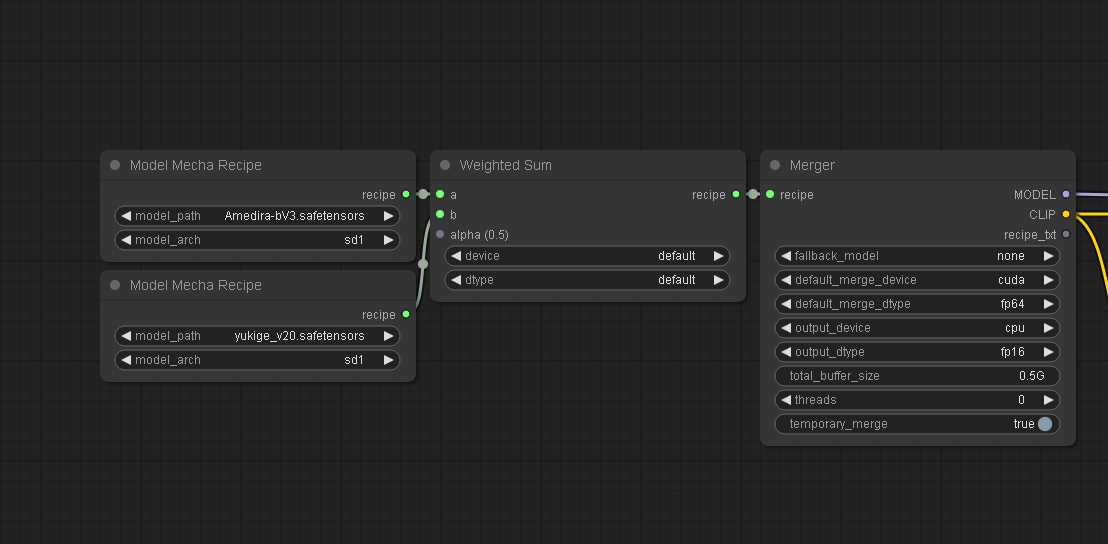Nodes Browser
ComfyDeploy: How Mecha Merge Node Pack works in ComfyUI?
What is Mecha Merge Node Pack?
model merging nodes powered by sd-mecha, a memory efficient state dict recipe merger.
How to install it in ComfyDeploy?
Head over to the machine page
- Click on the "Create a new machine" button
- Select the
Editbuild steps - Add a new step -> Custom Node
- Search for
Mecha Merge Node Packand select it - Close the build step dialig and then click on the "Save" button to rebuild the machine
sd-mecha for Comfyui
comfy-mecha is a complete model merging node pack for ComfyUI with a focus on low memory footprint.
- compose complex recipes without needing to save dozens of intermediate merges to disk
- merge loras to models
- support for block weights
- and a bunch of other stuff. For more info, see the nodes listing below. See also the readme of the underlying library sd-mecha
Workflows
Basic weighted sum

Clipped add difference

Ties merging

Recipe workflows can get much, much more complex than this.
If you are familiar with writing python code, you might be interested in using the sd-mecha library directly for experiments as an alternative to ComfyUI: https://github.com/ljleb/sd-mecha
Install
Install with ComfyUI-Manager
Assuming you have ComfyUI-Manager installed:
- Open a browser tab on ComfyUI
- Click on the "Manager" button
- Click on "Install Custom Nodes"
- Search for "mecha"
- Install "Mecha Merge Node Pack"
Install manually
You can also install the node pack manually:
cd custom_nodes
git clone https://github.com/ljleb/comfy-mecha.git
pip install -r comfy-mecha/requirements.txt
Nodes listing
Merge nodes
Nodes used for merging. They all have Recipe in their name except for Mecha Merger.
- nodes ending in
... Mecha Recipereturn a merge recipe Mecha Mergertakes aMECHA_RECIPEas input, and returns a unet and a text encoderSerializertakes aMECHA_RECIPEas input, and returns the recipe instructions using the mecha formatDeserializertakes a mecha recipe string as input, and returns the deserializedMECHA_RECIPE(this is the inverse operation ofSerializer)Mecha Model Recipeloads a model as a recipe to be used as input to other recipe nodes. model architecture auto-detection is not yet supported, so please make sure the rightmodel_archparameter is selected!Mecha Lora Recipeloads a lora model as a recipe to be used as input to other recipe nodes. again, model architecture auto-detection is not yet supported, so make sure to use the rightmodel_archMecha Recipe Listtakes an arbitrary number of recipes and returns aMECHA_RECIPE_LIST. It is intended to be used as input to recipe nodes that accept an arbitrary number of recipes as input, i.e. theboundsinput ofClip Mecha Recipe
Hyper nodes
Nodes used to specify hyper(parameters) to merge methods. For example, Weighted Sum Mecha Recipe has a hyper input alpha with a default value of 0.5.
Blocks Mecha Hypercan specify a different hyper for each block of the models to be merged (AKA "merge block weighted" or "MBW")Float Mecha Hyperspecifies the same float for all blocks of the models to be merged
Extensions
To add custom merge nodes, you can add python scripts that make use of the mecha extension API under the mecha_extensions directory.
The node pack will run all scripts placed there before creating the comfy nodes.
Currently, the documentation for the mecha extension API is under construction. For now, to get more information, you can either take a look at the custom merge method example, open a discussion post to ask questions, or join the discord server.